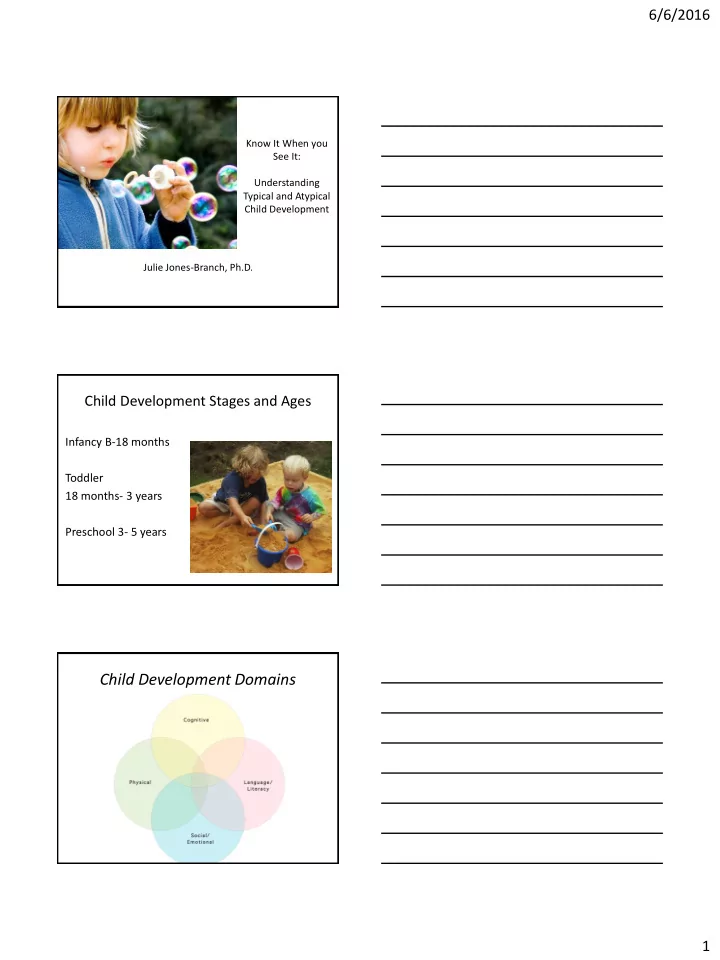

6/6/2016 Know It When you See It: Understanding Typical and Atypical Child Development Julie Jones-Branch, Ph.D. Child Development Stages and Ages Infancy B-18 months Toddler 18 months- 3 years Preschool 3- 5 years Child Development Domains 1
6/6/2016 Cognitive — Brain Development Synapses strengthen through exposure to repeated, meaningful experiences Critical Periods and Pruning 2
6/6/2016 Stages of Cognitive Development Piaget Sensorimotor — B-2 years Pre-Operational — 2-7 years Concrete Operations — 7-11 years Formal Operations — 12+ years Brain is not fully developed until mid-20s What do they need? • Predictable, Trusting environments • Less stress is best – (toxic shock) • Stimulation of their senses – Sight, Sound, Smell, Taste, Feel • Novelty What can Adults do? • Provide consistent, reliable routine • Offer variety of materials (sounds, textures) • Support children’s exploration – Describe/label environment – Show enthusiasm of children’s new discoveries • Understand stages of brain/cognitive development to set appropriate expectations 3
6/6/2016 Physical Development Large and Small Motor Large Motor Sequence Put the following 8 skills in order of ‘sequence’— add what approximate age it should occur: Running Rolling Over Kicking Cutting Crawling Skipping Catching Walking http://www.pbs.org/wholechild/abc/physical.html Tracking 4
6/6/2016 Importance of Tummy Time What do they need? • Space • Time • Variety of surfaces and textures – Safe heights What can Adults do? • Provide time, space and materials to explore • Encourage • Support physically – Help them ‘move’ from one skill to the next 5
6/6/2016 Sequence of Fine Motor Development Stages/Sequence of Writing What do they need? 6
6/6/2016 What can Adults do? • Offer opportunities with a variety of materials • Encourage by noting attempts and asking children to share what they have written/drawn • Do not criticize ‘incorrect’ letters/pictures Language/Literacy Development Receptive vs. Expressive Stages of Language Development (Birth to Age 3) 1. Crying 2. Cooing 3. Babbling 4. Gestures (8-12 months) 5. First words (8-18 months) 6. Telegraphic speech (18-24 months) 7. Grammatical speech (~2 ½ years) 7
6/6/2016 The 1995 Hart & Risley Study Meaningful Differences in the Everyday Experience of Young American Children by Betty Hart, Ph.D., and Todd R. Risley, Ph.D. “ With few exceptions, the more parents talked to their children, the faster the children ’ s vocabularies were growing and the higher the children ’ s IQ test scores at age three and later. ” “ The data revealed that the most important aspect of children ’ s language experience is its amount. ” = 8
6/6/2016 = = Piaget Assimilation and Accommodation “ The funny butterfly! ” 9
6/6/2016 “ I think it is a Black Grasshopper! ” Iyan 4 years What do they need? • To hear language – Read to – Talked to • To be able to have adults respond to their attempts at language 10
6/6/2016 Strategies for Extended Conversation (the more turns the better) • Show Interest • Paraphrasing • Repeating and pausing • Open-ended question • I wonder Statements • Connect to previous experiences Extending the Conversation A Mother-Son Story Mom [ buying bread at a little shop]: Sam, where do you think they get this bread? Sam [age 4.5]: They must make it at the back of the store. Mom [pause]: Do you remember when your school went to the bakery factory and saw them make bread? Sam : Yes. They must have a little machine like that in the back of this store. Mom : Hmm. How about these vegetables they are selling? Sam : They must grow them right out back of the store. Mom : Sometimes we go on drives in the countryside and see farms where vegetables are growing. Sam : That food is sold is stores in the country. But not in our store here. Sam = 4 turns Social/Emotional Development 11
6/6/2016 Stages of Play — Social Onlooker/Solitary Play Parallel Associative Cooperative Self-Regulation • Ability to calm • Self-control • Emotional recognition Emotions and Self-Regulation “ I hate you! ” “ I don ’ t want to be your friend! ” “ You are NOT invited to my birthday party! ” All of these statements MEAN… 12
6/6/2016 ‘Feelings come and feelings go….sometimes I don’t know what they’ll be. Whatever the feelings are, they are all a part of me!’ What do they need? • Trusting relationships • Time to develop • Opportunities to play with others and self-select activities • Understanding of adults • Adults to facilitate and support them What can Adults do? • Structure environment for least amount of stress – Should offer predictability and consistency • Recognize signs of basic needs • Name emotions • Suggest words to work through the situation • Offer physical support • Stay calm and neutral 13
6/6/2016 Resources 14
Recommend
More recommend